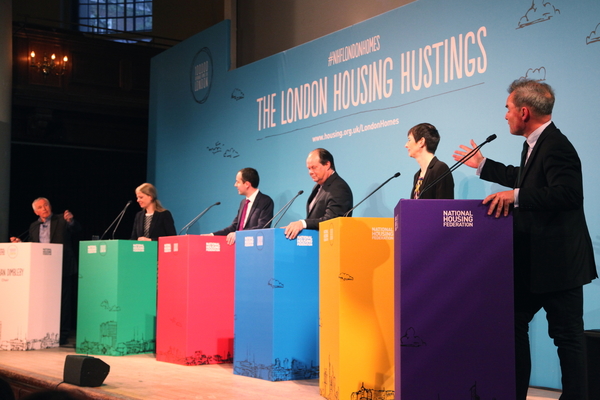Who won the housing hustings?
With Khan and Goldsmith snubbing the National Housing Federation’s housing debate last night, Pete Apps picks a winner from the remaining candidates

First, to address the absentees. Both Zac Goldsmith and Sadiq Khan pulled out of the National Housing Federation’s event at the 11th hour, which meant the likely next mayor of London was sadly not on stage at all.
What can be read into this? Perhaps only that both felt talking to a well-informed crowd who had likely already decided how to vote was not worth it. Or perhaps it was a sign that both feel potentially weak on housing and didn’t want it to make headlines 10 days out from the election.
Both excuses – especially considering the withdrawals arrived on the day of the event – were deeply flimsy.
Sadiq’s camp explained his absence by saying he wanted to “speak and vote” in a simultaneous parliamentary debate on Syrian refugees.
But Hansard shows he didn’t actually speak in the debate, and the vote itself took place a good hour after the end of the hustings. Inside Housing timed the walk from the Westminster venue to Parliament at one minute and four seconds (and that after two glasses of red wine), so the Labour candidate could easily have appeared at both.
Meanwhile Zac was off talking to residents in Hillingdon about transport leaving Stephen Hammond, the former junior transport minister, to step in to the housing debate.
So in the eyes of the audience, Zac and Sadiq were the clear losers before the debate even began. But how did everyone else do? Here is Inside Housing’s unofficial ranking:
1. Winner – Sian Berry, Greens
At the drinks afterwards, there was a near unanimous acceptance that Ms Berry had been the most impressive candidate in the debate. An accomplished speaker and the most passionate voice on the panel, she landed clear blows on her obvious rivals – calling out Labour stand-in James Murray for being weak on rent control, and the Liberal Democrat Caroline Pidgeon over the costing of her plans.
In terms of policy, she insisted that lifting supply alone will not make housing affordable, and drew the biggest applause of the night by setting out a clear opposition to the demolition of housing estates, instead calling for retrofit and renewal. This sparked cautionary words from audience member and L&Q chief David Montague in favour of positive regeneration, but played well with most of the audience.
Plans to re-introduce the Olympic Precept to fund public housing, and a pledge to work with housing associations of all sizes, were also well received by the crowd.
2. Caroline Pidgeon, Liberal Democrats
Ms Pidgeon pledged to continue Olympic Precept – a special council tax originally introduced to fund the Olympic Park – to fund housing, but faced questions from Ms Berry on whether this adds up without lifting it back up to the Olympics level as she suggested.
As the only member of the panel currently sitting in City Hall, Ms Pidgeon was able to look more credible than the rest of the panel.
“I would get you straight in to meet with my existing team at City Hall, some of whom I can see in the audience now,” she pledged – ramming the point home a little unsubtly. Flagship policies of a City Hall based building company to work alongside the existing sector and a skills academy came across as both sensible and deliverable.
However, she was repeatedly dragged into debates about migration with the UKIP candidate to her left, which left her short on time to get her points home.
The crowd takes in the debate at the venue near Parliament
3. James Murray, Labour (stand-in for Sadiq Khan)
Mr Murray, the cabinet member for housing at Islington Council, is tipped to be the next deputy mayor for housing and proved a reasonable replacement for Mr Khan. However, he faced an uphill battle to overcome the ire about his candidate’s absence and was outflanked and out-talked by the more practiced Sian Berry next to him.
This aside, he was able to raise applause from the audience for his attacks on the Conservatives over Starter Homes and the Local Housing Allowance (LHA) caps.
“London has a clear choice on housing,” he claimed. “We can let more and more Londoners be priced out or we can do something about it.”
His weakest moment was his refusal to back rent caps, explaining that it was not within the mayor’s remit and the candidates should “focus on what can be achieved”. This was immediately leapt on by Ms Berry, who insisted the mayor should and could lobby for rent capping, if it was the right thing to do. She and other candidates who put forward an opposition to capping looked stronger on this point.
4. Peter Whittle, UKIP
Housing is never going to be UKIP’s strong suit, and Mr Whittle’s attempts to steer the debate down the path of immigration (“we need to tackle the demand side of this issue”) quickly came unstuck.
First, he found himself teased by chair Jonathan Dimbleby over how and why he wanted to stop people moving to London (“so you want to stop the growth of the city?”). Next he was required to admit the mayor has no influence on immigration policy. Finally, he contradicted himself by saying he didn’t want to limit immigration to London, but wanted a fairer policy where “engineers and doctors from India” could come in rather than European workers. Regardless of the validity of this claim, these immigrants would still, presumably, have a demand for housing – torpedoing his central argument.
Nonetheless, he managed to redden a few faces over the question of Brexit limiting the pool of available labour for housebuilding. “I’ve never seen such a right-on, liberal panel acting as the mouthpiece for big business,” he said. “These workers come over here to be roundly exploited.” A smattering of applause followed, but it was not his night.
Peter Whittle, Ukip, clashes with chair Jonathan Dimbleby
5. Wooden spoon – Stephen Hammond, Conservative (stand-in for Zac Goldsmith)
The former junior transport minister, rather appropriately, had something of a car crash. First, his explanation that Zac was “with the secretary of state in Hillingdon talking to residents about HS2” sounded weak compared to Sadiq’s sick note (standing up for refugee children).
He followed this with a bizarre defence of Starter Homes, claiming that the “pilots are demonstrating homes are being sold at half the ceiling value [£450,000 in London]”. Starter Homes, still subject to consultation and statutory approval, are not yet being piloted.
His claim that an affordable home is a “home that can allow a Londoner on the average wage to get the keys to their first property” was pulled up by chair Jonathan Dimbleby, who forced him to admit there was no flexibility for different areas of the capital. Mr Hammond then upset the chair further by twice referring to him as David (his brother).
He drew heckles for claiming “Conservative Wandsworth is the only borough in London with a plan to build 11,000 council houses”. Actually several Labour boroughs have similar pipelines, and he substantially understated Wandsworth’s plans which sit at 18,000.
Finally, he rounded off his night by landing a blow on Zac Goldsmith, as he made an ill-judged attack on UKIP’s Mr Whittle over the threat Brexit poses to housebuilding. Zac Goldsmith supports Brexit.
He was able to give Labour a drubbing about the black hole left by Sadiq’s transport plans, but as this was a housing debate its nul points for the Wimbledon MP.











